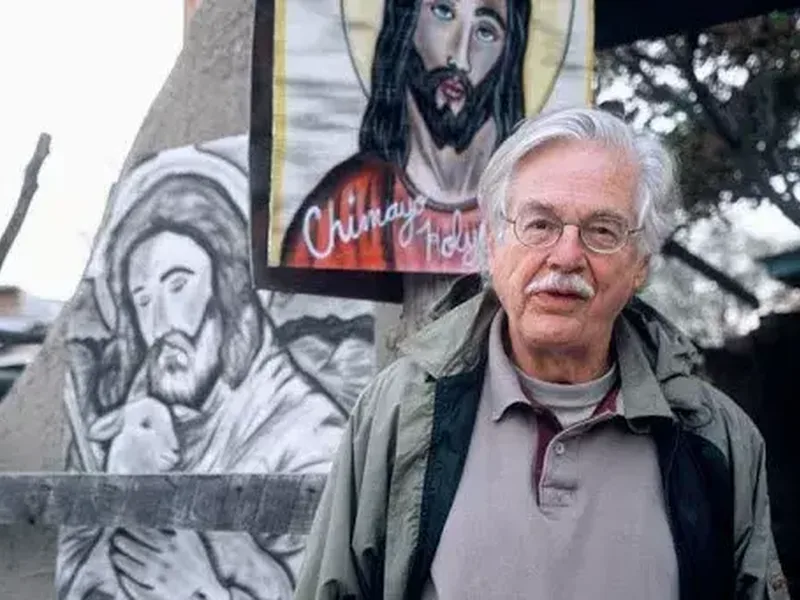
An Inspiration for i-coach academy
One of the most influential people in the establishment of i-coach academy, Will McWhinney passed away this April. In fitting memory, Coaching Matters pays tribute to Will as an outstanding academic in the field of systems thinking and a personal friend, mentor and inspiration for Professor Mike van Oudtshoorn, Founder of i-coach academy.
Will McWhinney may not be a name with which the i-coach academy community is familiar. Yet if you are a part of our community you will inevitably have been influenced by Will and his outstanding contribution to academia. When planning this tribute, Prof. Mike van Oudtshoorn described the very style of i-coach academy as a reflection of the ideas put forward by Will.
Mike met Will during his time teaching at the Fielding Institute in Santa Barbara. They stayed in contact over the years and Mike was among many who paid tribute to Will at his funeral.
An unbelievable intellect
In Will’s own words, he describes his engagement with systems thinking as ‘a history of recognising the multiple and complex ecologies of the intellectual forest, and growing up with systems thinking from its seedlings in the 1950s to its emergence into the mature disciple in the new millennia’ (Growing into the Canopy, Journal of Transformative Education October Issue 2007).
In 1951, Will began his career with AT&T, then the largest private organisation in the world. He too this job hoping it would allow him to work with myth, philosophy and mathematical models of organisational behaviour. During his time with AT&T, Will helped plan the first trans-continental TV network and then later helped to select and program the first electronic computer to be installed for industrial applications.
However, it wasn’t long before Will’s interests moved beyond the formal organisation model of AT&T. He joined the General Systems Society as a chartered member and began his Doctorate at Carnegie Tech in 1958. At Carnegie Tech, Will worked on chess and later Japanese computer games developing rules, unambiguous responses and eventually allowing players to develop spheres of influence. His work led him to explore multi-agent systems and requisite energy inputs in self-organising systems.
Will then went on to co-found a business school at Leeds University and later was invited by the management faculty at the UCLA to join in an effort to redesign the MBA curriculum and create the first American STS programme.
In the 1960s, Will joined a group of consulting clients from Proctor and Gable and helped develop a practice which the group named Open Systems Planning (OPS). With OPS, Will and his colleagues enabled groups of workers to design their work environment and gain a deep sense of participation in management tasks, thereby creating many of the earliest semiautonomous installations in companies across the US and Europe.
Following the civil rights riots in Los Angeles, Will joined efforts to rebuild housing and the arts community in central Los Angeles and continued working with marginalised groups and not-for-profit organisations.
In 1979, Will was presented with the opportunity to help develop the innovative Doctorate programme in Human and Organisational Systems for mid-career professionals at the Fielding Institute in Santa Barbara. This programme spanned the full range of systems thinking through an education primarily focused on face-to-face mentoring and electronic communication. It was during this time, that Will met Prof. Mike van Oudtshoorn who, after expressing interest in the Fielding Institute Doctor programme, was convinced by Will to join the teaching faculty.
After years of exploring and developing systems thinking, Will wrote his well-renowned book Paths of Change which established a new combination of analytic and expressive tools for resolving complex issues in organistions and communities. The sequel, Creating Paths of Change, was written to make the tools particularly user friendly for change managers and consultants. Most recently, Will was working on the unfinished work Grammars of Engagement which was working towards taking system theory into a new exploration of communications and conflict resolution. (A group of Will’s former students and colleagues are busy using and extending his work however at this stage the group is unsure whether they will be capable of finishing his last work.)
At the time of his passing, Will was Chairman of the Board of HealthSpan International, an organisation bringing health care and telemedicine to Tanzania. He was Founding Editor of the Journal of Transformative Education, past vice-president of International Synergy and headed his own consulting organisation, Enthusion.
Will and i-coach academy
It was Will’s philosophies and encouragement that gave Prof. Mike van Oudtshoorn the inspiration to establish i-coach academy. In particular, Mike attributes Will’s ‘AS IF’ concept as setting the pathway for the establishment of i-coach academy.
The concept suggests that if you want to bring about change, you should behave as if the change has already happened. The reason being, if people perceive that the change has already happened, they are more likely to believe in its success and provide the necessary support.
Sadly, despite playing such a prominent role in the establishment of i-coach academy, Will never got to meet the i-coach academy communities in person or see the impact of his influence.
At his funeral Will’s good friend and one of Mike’s past students, Jim Webber said “Will gave to us his last breath” (A comment he read from Elizabeth Montgomery on the FGU Winter Season 2007).
“(Will gave a) persistent effort over 15 years and multiple cycles of incubation to bring Paths of Change to fruition,” Jim said.
Will will be sincerely missed and i-coach academy passes its sympathy to his wife Veronica “Bonnie” Flynn McWhinney and his family.
Coaching Matters especially thanks Jim



